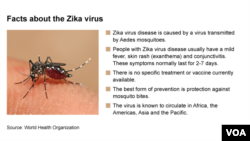The U.S. Congress is set this week to consider several measures to fund research into a vaccine for the deadly Zika mosquito virus and a plan to control mosquitoes that spread the disease.
The question remains, however, how much lawmakers are willing to spend to curb the virus that can cause the birth defect microcephaly, which leaves babies with small heads and deformed brains, and impairs growth.
Three months ago, President Barack Obama proposed a $1.9 billion plan to develop a vaccine, control the mosquitoes and help other countries fight the virus. But his Republican opponents in Congress said that was too costly and balked at approving it.
Republicans in the House of Representatives offered a $622 million proposal Monday for vaccine development and international mosquito control.
The Senate is planning to start voting Tuesday on Obama's plan, a competing Republican alternative and a compromise measure costing $1.1 billion.
Even if these measures clear the two chambers, the outlines for a final accord are not clear.
To date, there have been more than 500 cases of Zika contamination in the United States, all of which so far have been associated with overseas travel. Last week, Puerto Rico, a U.S. territory in the Caribbean Sea, reported its first case of Zika-borne microcephaly.





